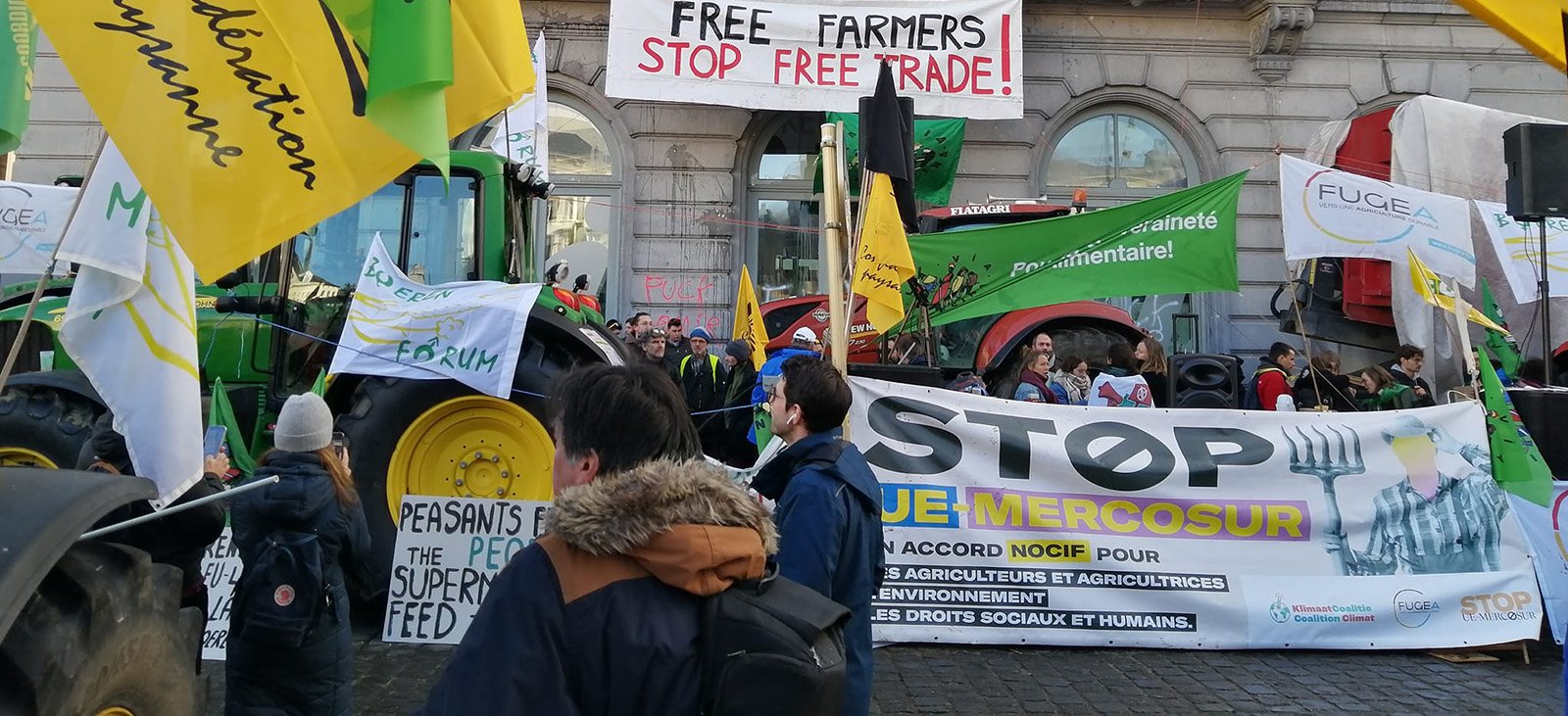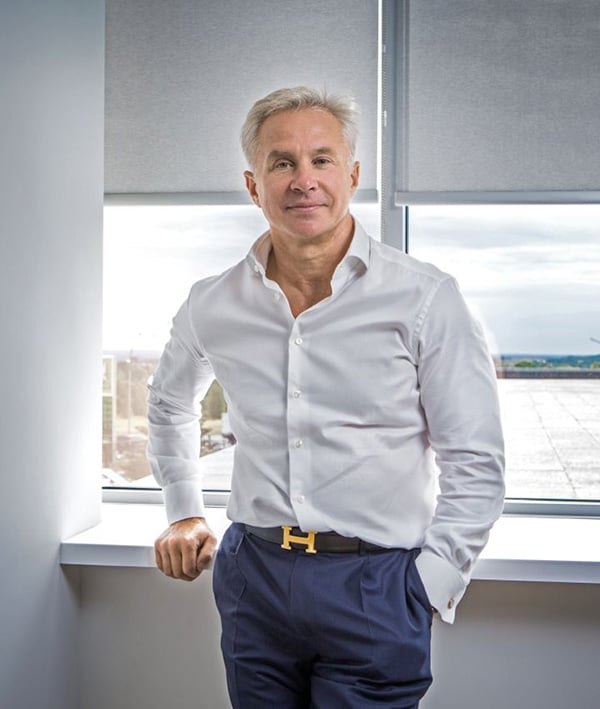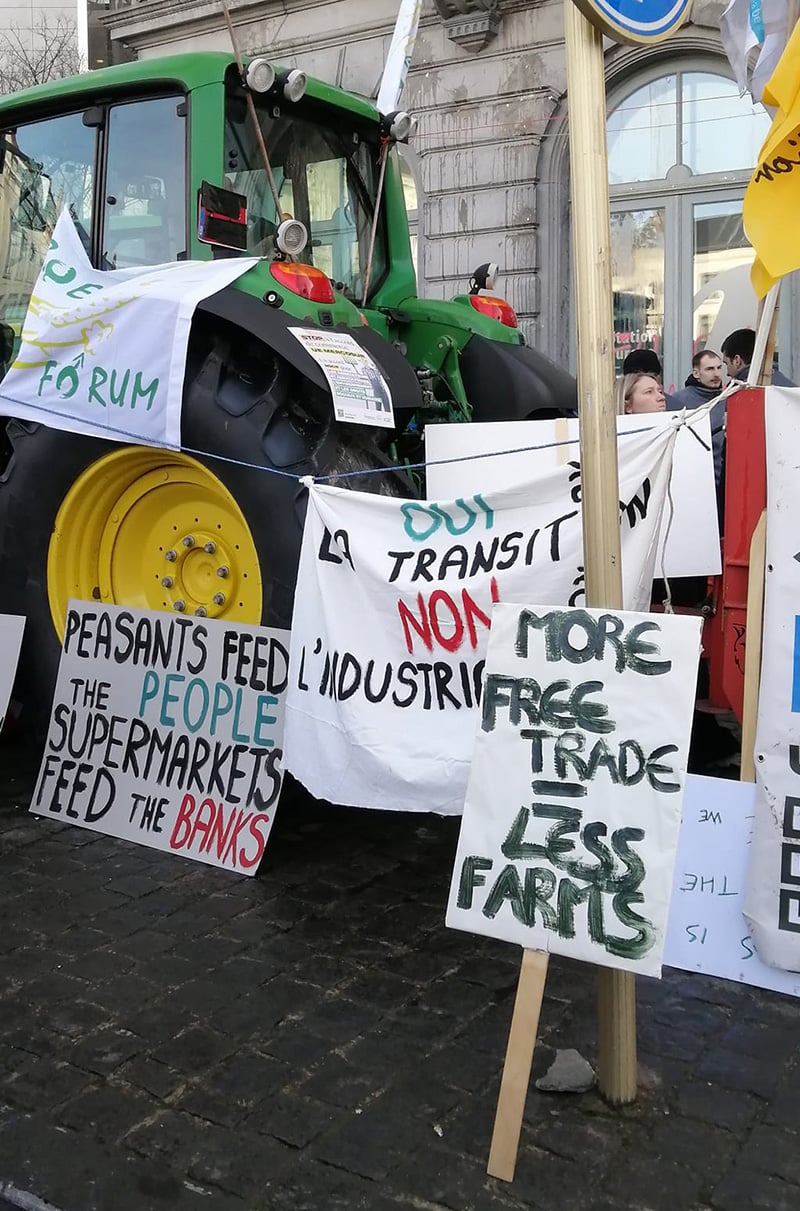When European Institutions Sacrifice Farmers for Corporate Profit
 Farmers protests in Brussels. Source: Confédération paysanne
Farmers protests in Brussels. Source: Confédération paysanneA wave of farmer protests has spread across Europe since January 2024. In several countries, including France, Belgium, Greece, Italy, Spain, Poland, Germany, and the Netherlands, farmers have mobilized through demonstrations and roadblocks to protest unfair competition, tax burdens, excessive regulation, and an overall lack of recognition and support. One example of the difficulties faced by farmers – one that many protestors point to – is the dumping of cheap Ukrainian chicken into Europe.
The company behind the majority of these imports is Myronivsky Hliboproduct (MHP), the largest industrial poultry producer in Europe. MHP processes a whopping 13.4 million birds weekly for over 700,000 tons of poultry meat per year. The firm operates as a vertically-integrated operation, controlling all aspects of the production chain – from fodder, to eggs, to chickens, to meat distribution. It controls over 360,000 hectares of land, making it one of the largest landholders in Ukraine. Its access to such a large swath of land and less stringent production standards than in the European Union (EU) allows the firm to enjoy lower production costs than many farmers across Europe. But these factors alone do not explain MHP’s swift business expansion and capture of the European market.
In June 2022, following the Russian invasion of Ukraine, the European Commission suspended import duties, quotas, and other market protections on Ukrainian agricultural goods, including poultry. “This strong testament to the EU’s unwavering support for Ukraine will help alleviate the difficult situation faced by Ukrainian producers and exporters because of Russia's unprovoked and unjustified military aggression,” stated the Commission at the time. Many blame the lifting of market protections for the increased dumping of Ukrainian poultry on European markets. Once these measures went into effect, the EU saw its all-time highest imports of chicken from Ukraine – 160,000 tons in 2023, a 150 percent increase from average pre-2022 import volumes. However, the recent exemptions only provide a partial explanation for the rise in imports. Ukrainian poultry imports into Europe first started to rise in 2014, after the ratification of the EU-Ukraine Association Agreement, with a jump of 6,800 percent in a single year, from 210 tons in 2013 to 14,500 tons in 2014.
|
Lending to MHP by IFC, EBRD and EIB
|
||
|---|---|---|
| Year | Bank | Amount (million US$) |
| 2003 | IFC | 30 |
| 2005 | IFC | 80 |
| 2010 |
IFC
EBRD
|
61
65
|
| 2012 |
IFC
EIB
|
50
90
|
| 2013 | EBRD | 100 |
| 2014 | IFC | 100 |
| 2015 | EBRD | 85 |
| 2017 | EBRD | 27 |
| 2022 | EBRD | 26 |
| 2023 |
IFC
EBRD
EBRD
|
130
100
90
|
| Total | 1,034 | |
With Ukraine’s political and economic association with the EU, financing of large agribusiness firms by international banks significantly increased – allowing the industrial poultry sector, and MHP especially, to expand. MHP has been bankrolled by several international “development” banks – in particular the private-sector arm of the World Bank, the International Finance Corporation (IFC), the European Bank for Reconstruction and Development (EBRD), and the European Investment Bank (EIB). The IFC employs a “blended finance” model through which it is an implementor for the European Fund for Sustainable Development Plus, an EU-based fund. In total, MHP has received more than a billion dollars in loans from these three institutions – US$451.25 million from the IFC, US$493 million from the EBRD, and US$90 million from the EIB. This makes MHP the single largest beneficiary of funding from Western public banks, which in the past 20 years have lent over US$3 billion to just a handful of large Ukrainian agricultural conglomerates.
Financing by public banks of a giant agribusiness such as MHP raises serious concerns. First, this support goes to a company controlled by an oligarch – Yuriy Kosyuk, the tenth richest person in Ukraine, who was worth US$1.1 billion in 2020.  Yuriy Kosyuk, Source: MHP https://mhp.com.ua/en/pro-kompaniu/rada-direktoriv-mhp-se The board members are linked to its financers – John C. Rich, MHP’s Executive Chairman, has served as a consultant for both the IFC and EBRD – an obvious conflict of interest.
Yuriy Kosyuk, Source: MHP https://mhp.com.ua/en/pro-kompaniu/rada-direktoriv-mhp-se The board members are linked to its financers – John C. Rich, MHP’s Executive Chairman, has served as a consultant for both the IFC and EBRD – an obvious conflict of interest.
Second, public banks are financing a company accused of fraud. It is offshored in Cyprus, which allowed it to avoid up to US$98 million in Ukrainian taxes between 2006 and 2020, while all along paying no corporate income tax on the billions it made in profit. In 2018, it was also found to be exploiting a loophole in EU import quotas that allowed it to avoid the quotas entirely.
Third, MHP is currently the subject of two complaints filed under the IFC and EBRD’s complaint mechanisms by local communities around MHP’s Vinnytsia Oblast complexes in central Ukraine. MHP is accused of withholding critical information from local communities, property damage, water pollution, and human rights abuses. MHP has also stated its plans to expand its land holdings to 550,000 hectares – land it has historically leased from small farmers in local communities, often by exerting pressure on them.
Bankrolling MHP caters to a number of foreign financial interests directly interested in the company as shareholders or creditors.
Fourth, MHP’s production does not comply with international standards for transparency and environmental impact – the very same standards being applied to farmers in Europe. Despite these accusations and still being under investigation, MHP received US$130 million from the IFC and US$216 million from the EBRD since the complaints were filed in 2018.
These international banks claim to fund MHP to improve resilience and food security. Could the real reason for the massive support they provide, however, be elsewhere?
Bankrolling MHP caters to a number of foreign financial interests directly interested in the company as shareholders or creditors. Other than the oligarch Kosyuk, who controls 59.7 percent of the capital, MHP’s shares are held by a number of Western investment funds, including the US-based Kopernik Global Investors (6.2 percent), Norway-based Norges Bank Investment Management (3.1 percent), Cayman Island-based Prosperity Capital Management (2.2 percent), and the French BNP Asset Management (1.4 percent), among others. MHP is also indebted to a number of European banks, including the Dutch ING Bank and Rabobank, German Landesbank, and Slovenian ABANKA. This gives shareholders and private lenders obvious stakes in the success of MHP operations.
 MHP poultry farm in Ukraine. Source: Accountability Counsel
MHP poultry farm in Ukraine. Source: Accountability Counsel The goal of the financing by IFC, EBRD, and EIB is very explicit in the banks’ loan agreements. IFC stated in 2023 the goal of the financing was “to support the Company’s expansion plans.” An earlier financing decision was to “expand [MHP’s] poultry operation,” including “the construction of a new slaughter plant, with processing capacity of 10,000 birds per hour.” Loan disclosure documents make it clear that the EBRD had similar goal of proving “working capital associated with expanding operations.”
 Farmers protest in Brussels. Source: Confédération paysanne
Farmers protest in Brussels. Source: Confédération paysanne Responding to farmer concerns, on January 30, 2024, French President Emmanuel Macron announced support for reinstating regulatory measures on agricultural imports from Ukraine. He stated that European support of Ukraine should not “create a situation of unfair competition that benefits a few billionaires.” The next day, the European Commission announced the introduction of safeguards on “sensitive products,” such as poultry, eggs, and sugar. These announcements satisfied some of the farmers organizations, who suspended their movement in several countries including France in the following days.
However, the measures announced by the French President and the European Commission are highly misleading and blatantly fool the farmers. First, the EU safeguards would only reapply pre-war tariffs if import volumes increase above the levels seen in 2022 and 2023, which are very high thresholds, given imports have skyrocketed since 2014 and were at already high levels in these two years. Secondly, the EU has not made any mention of the millions of financing that continues to be funneled to MHP, guaranteeing its ability to expand and dominate poultry markets.
The focus on tariffs and quotas is nothing less than a smokescreen given the real culprit is the financing.
The focus on tariffs and quotas is nothing less than a smokescreen given the real culprit is the financing. Farmers will continue to face unfair competition from Ukraine as long as MHP continues to be bankrolled by these institutions. The hypocrisy of the European Commission is appalling when it claims to protect farmers by setting up inadequate safeguards and allowing European bankrolling of a massive and predatory agribusiness that is harming European farmers. What the European Commission called “unwavering support for Ukraine” has devolved into unwavering support for oligarchs and their associates. European institutions and the World Bank must be held accountable for this scandal and immediately end these corrupt deals.
